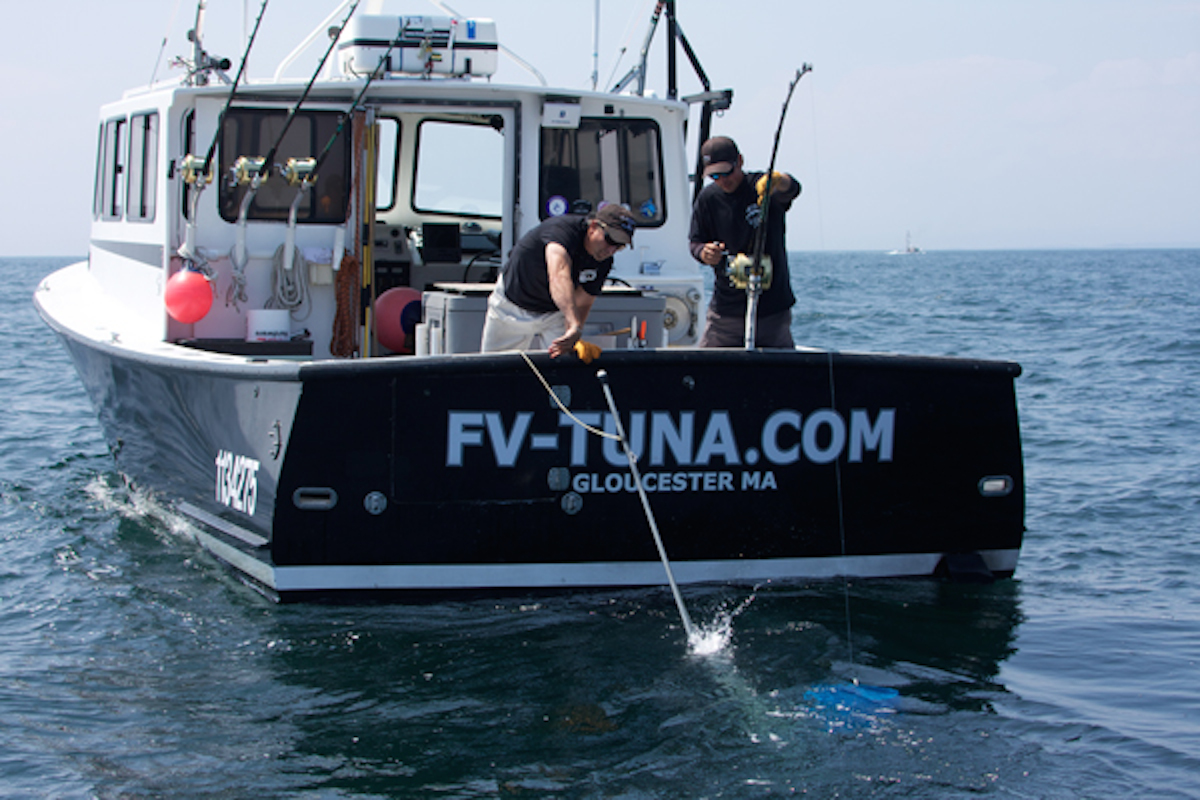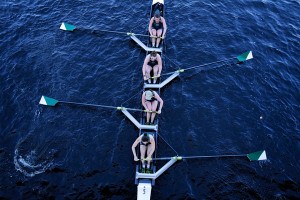Catching Up with the Captains of Wicked Tuna

Photo courtesy of National Geographic
Wicked Tuna, National Geographic’s Gloucester-based reality show about a handful of bluefin tuna fishermen, is back for its third season this year, and so far, the Tunas are in for some serious competition. Among the several captains who lead their respective crews and fishing boats are Dave Carraro of FV-Tuna.com and Bill Monte of The Bounty Hunter. After talking to the captains about boat names, making money off tuna, and working in spite of hectic camerawork, it’s clear they’re both as hardcore and competitive as they come.
Captain Dave Carraro of FV-Tuna.com
What’s the story behind your boat’s name, FV-Tuna.com?
Tuna.com became the tuna.com back in the dot-com boom when everything was “this-dot-com” and “that-dot-com.” Nothing more than that—and I can’t take credit for it. It was actually my partner at the time who came up with that name about 15 or 20 years ago.
How would you describe yourself as a captain in just a few words?
As a captain…well, it depends. Competitive. Safety-conscious—although there are risks involved, but we try to reduce those as much as possible. And one that wants to succeed, catch the most fish, and make a lot of money.
I read that you’re a certified airline pilot.
That’s right, I’m a captain at JetBlue.
What made you pursue that career path alongside fishing?
I’ve been fishing since I was a little kid, but I graduated from the Academy back in 1992. I was 26 years old. But again, I was a fisherman first and a pilot second. As a pilot though, I had quite a few friends that did it. I knew how much time they had off, and being a pilot fits my lifestyle. With all the time off, it allows me to fish when I choose.
That said, what is your typical week like?
About four or five days of fishing—could be spread out or could be all at once. When I come in from fishing, a lot of the times I just run home, take a shower, put my tie on. Grab my flight bag and head to the airport. And then I’ll be away for two or three days. It’s a busy schedule—fishing to flying, flying to fishing. There’s not much time on land. I’m either up in the air or on the water.
I like that. I also read that you guys had to send in an audition tape for Wicked Tuna. What was that tape like?
[Nat Geo] gave us a phone call, and called me specifically, and asked if I was interested in doing the show with my crew. So we just continued the process and they sent us a little mini-camera. Along with the camera was a list of questions. We just set the camera up on the boat and the three of us—myself, Sandro, and Paul—sat in front of the little camera and took turns answering the questions one by one. When we were done with that, we packed it up, put it in a little bag, and sent it back. About a week later, they called us and asked if we were interested in doing the show.
What’s it been like for you having cameras so present in your work life?
Well, we always have six people on the boat in addition to two crew members for a total of eight people. When we’re filming, there’s only one cameraman on the boat at a time. It’s really not that bad. But the cameras are always in your face 24 hours a day, pretty much seven days a week. As for walking around, it’s really not an issue. We’re always used to six people on the boat, and now we only have one. But you know, it’s nonstop. They’re always asking questions. We had 16,000 hours of footage last year for basically 44 minutes of TV [per week]. There’s a lot of footage you don’t see. But 16,000 hours of footage—that’s a lot of work and a lot of time on camera.
It looks like you’re very aware of being on camera all the time. Is anything scripted? I’ve heard with reality TV, it’s not necessarily scripted, per say, but they encourage you to take direction?
I wouldn’t say anything’s scripted, really. We’re fishing, so there’s plenty of drama on its own. None of it really has to be fabricated. But there are times when the cameraman has his camera down in his lap or he’s eating a sandwich, and I say something that he thinks is interesting, but it’s not on film. At that point, he’ll ask me to say that again. So yeah, what you see is pretty much what you get. It’s really no different.
What’s the craziest moment you can recount while at sea?
The craziest moment that we’ve had to shoot by far comes from an episode that’s airing this week. We had to fight a fish for about 10 hours. It was very long and strenuous, both physically and mentally. We caught that fish at five o’clock in the morning and we went all the way pretty much until 5 p.m. at night. We were fighting that fish in very, very rough seas. But that was definitely the highlight of the summer.
Captain Bill Monte of The Bounty Hunter
How would you describe yourself as a captain in just a few words?
I can tell you that we love to fish, we want to have fun, we want to make a few dollars, and we love chasing giant bluefin.
How competitive would you say you are?
I’m the older of the bunch now, so it’s a little harder for me. But you know what, I’m still there. And we’re gonna give it hell until we can’t do it anymore. And after that, about two more years.
Ha! So tell me about your biggest success story as a fisherman.
I think the height of the whole thing was quite a few years ago when they used to have a Cape Ann giant tuna tournament. We were lucky enough to win it two years in a row with an 802-pounder and a 900-pounder. My wife, Donna, was in the fighting chair for both of those fish, and she won it. And that was a great two years.
What’s it like having the cameras so involved in your everyday life?
At first it was a little bit hard. But now you don’t even see the cameras. It’s unbelievable, you forget about them. Once in a while the cameraperson will get in the way, but you know, we take care of them. And they’re very good. They’re all professional. Once they learn the routine on the boat, then they’re very good. So it makes life easier. But the best part of the whole thing is when the little kids come to the boat, and they’re so excited. It’s great.
What’s the schedule like with the cameras?
They’re there every day that we go fishing. And then we do a lot of voiceover type things in the studio, and we also do them on the boat when we have time.
Let’s talk about fishing lingo. I picked up a few words from the show, specifically googan, which is my favorite. Are all these words something you created or something you’ve learned?
Most of that stuff is really not made up, it’s been there for a long time. Now you’re just getting to see it. Googan [a sport boat who thinks he’s a fisherman] was a term that’s been around for many, many years. When you use it every once and while, you really do [pick up the lingo]. All the things you see on that show are not made up. They are real things that have been around for years.
I read that you met Donna through fishing. What’s the story behind that? And how much of a role does she now have in your work life?
So I used to race cars, and one day I bought a boat. We were dating then and we went fishing. And she beat me bad. And that’s when I knew I needed to marry her. She [now] goes fishing as much as she can. She’s very good at it, she’s probably caught more giants herself in the fighting chair—when we had a fighting chair—than most of the people around. She’s got a lot of strength in her legs, but not a lot in her arms. So the way we do it [without the chair] requires a lot of strength in your arms. But she’s very good at it. She used to go four hours in the chair, and I had guys cry after two hours to get out.
What’s your general reaction to how engaged your fans are with the show?
The people we meet on the streets are so unbelievably nice. We have a great time. People love us and it’s really fun to do. The only people who make it difficult—it was difficult the first year—was all the keyboard heroes that have nothing better to do than harass us [online]. But after a year or so we got used to it and learned to ignore it and whatnot.
Wicked Tuna airs Sundays at 9 p.m. on National Geographic Channel.

